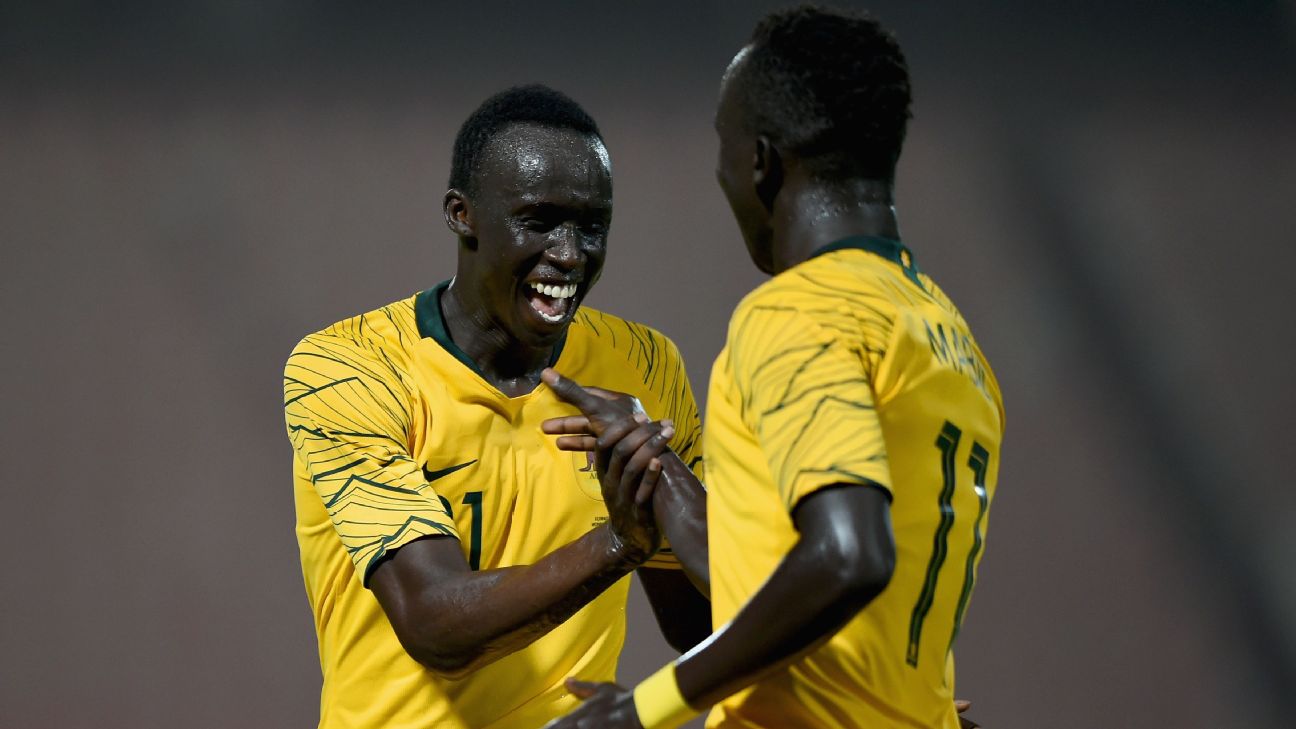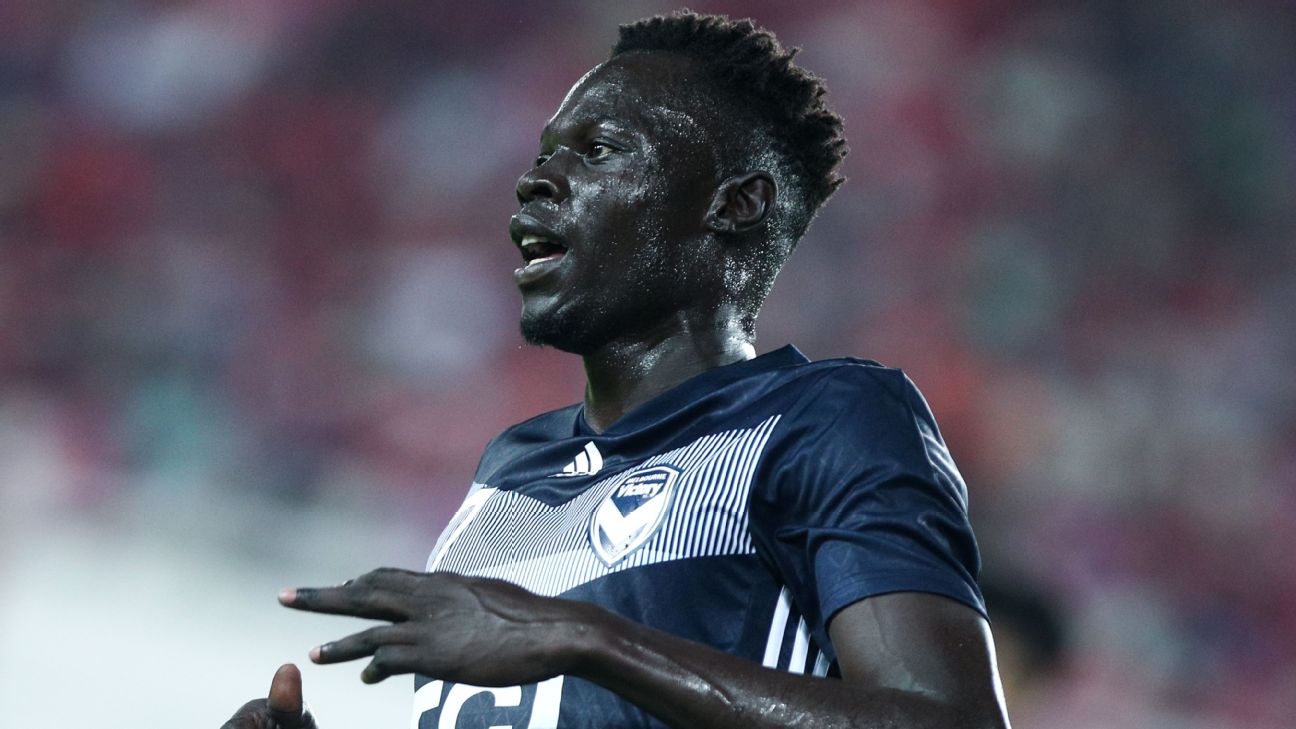
The world’s newest sovereign state, South Sudan, will begin its long road to qualify for the 2021 African Cup of Nations on Oct. 7 with a match against the Seychelles. Remarkably, 12 of the 32-man squad will be making the journey of more than 7,000 miles from Australia to join coach Ashu Cyprian Besong and the rest of the national team in Khartoum to prepare for the two-legged preliminary round tie.
South Sudan’s football history is a relatively short one. The Bright Stars’ first international match was played in 2012, just after the nation gained independence, and Besong’s men currently sit at a lowly 173 out of 210 in FIFA’s world rankings.
Indeed, South Sudan have already been knocked out of contention for the 2022 World Cup in Qatar, falling to Equatorial Guinea in a 2-1 aggregate defeat in September. Results, though, tell only half the story for the South Sudanese.
Sitting in the shadow of AAMI Park in Melbourne, Australia, as he prepares to fly out to join his teammates in Africa, Kenny Athiu smiles as he recalls the moment when he stepped out on the pitch to face Equatorial Guinea, revealing the history that echoed in his footsteps as he crossed the touchline and became a South Sudan international.
“My father and my grandfather, they fought for their independence … for their country,” Athiu told ESPN.
“For me, it felt like I was continuing on the same path in representing their country and fighting for their country.”
– Maclaren double fires Melbourne City into FFA Cup final
– A-League scraps radio advertising ahead of new season
– Besart Berisha returns to the A-League
Athiu forms part of a rapidly growing South Sudanese diaspora in Australia. Alongside Central Coast Mariners Ruon Tongyik and Abraham Majok, Athiu is one of three of the Bright Stars’ Australian-based call-ups who is signed to a professional A-League club. The remaining nine — Majak Mawith, Peter Deng, Mathiang Mathiang, Jackson Morgan, Denis Yongule, Dhour Chol, Maker Maker, Yacoub Mustafa and Friday Zico — ply their trade with clubs in Australia’s semiprofessional leagues.
All 12 footballers represent a snippet of the remarkable collection of talent being produced by Australia’s small South Sudanese community. Just 3,487 people named South Sudan as their country of birth in the 2011 Australian census. Those numbers grew to 7,694 in 2016 and are now estimated at more than 11,000, a quarter of whom are under the age of 25.
Mawith, 20, is a highly athletic goalkeeper capable of producing spectacular, split-second reaction saves, and he plays with semiprofessional side Port Melbourne Sharks. Born in the Kakuma Refugee Camp in Kenya, he, like a great number of Australia’s South Sudanese community, arrived in Australia as a refugee from the decades of conflict that gripped the nation.
“I don’t remember much, being really young,” he said of his 2005 journey to Australia.
“But I just know it wasn’t easy from the teardrops that drip from my mother’s eyes whenever it comes time to tell a story about life back at home.”
Australians of South Sudanese origin often struggle to find affordable and sustainable housing, access to education and secure employment in their new home — 26.4% of respondents to the 2016 census responded that they were unemployed. Having experienced horrors that others could only guess at, the South Sudanese — like so many migrant groups before them — have found a sense of community, belonging and opportunity on the sporting field.
Mawith spent a portion of his childhood in the regional Australian city of Shepparton before relocating to Melbourne and spending time in the academies of Melbourne Victory and Melbourne City. It was a pathway made possible thanks to his hard work and the support of a caring teacher.
“We came to Australia with nothing, only with hope for a new beginning,” he said. “It was very hard for me and my older brother, Akeen, because we went from being by my mum and dad’s side every minute of the day to being sent away to go to school. Our parents worked every day to provide for us.
“My Principal, Mr. Popa, helped us get through this hardship by introducing us to sport as a distraction. He got both me and my brother playing cricket, Australian Rules, tennis and football. He bought my brother and me our first bikes to get to training and to school with.
“The only reason I decided to take football seriously was because of the friends I made. I made friends from all different racial backgrounds, and we all loved one thing, and that was being able to kick a ball together.”
Much like the rest of the world, Australia is beginning to see the amazing results that have arisen from this love of sport, with an array of South Sudanese athletes following a trail blazed by the likes of Manute Bol and Luol Deng.
Thon Maker — the brother of Maker Maker, one of the 12 Australia-based footballers named in the South Sudan squad — was picked 10th overall by the Milwaukee Bucks in the 2016 NBA draft and now plays for the Detroit Pistons. In 2018, Joseph Deng broke a 50-year-old Australian record in the 800 metres. Majok Daw and Aliir Aliir are at the forefront of a South Sudanese push into Australian Rules Football.
In October 2018, Awer Mabil and Thomas Deng made headlines when the two made their debuts for Australia’s national football team in a friendly against Kuwait. With Deng involved in the buildup, Mabil scored his first goal for the Socceroos in that match and, in a moment of immense pride for Australia’s South Sudanese community, the images of him celebrating with childhood friend Deng went viral across Australia.

Athiu detailed how the close-knit group celebrates the success of all its members, regardless of the flag they compete under.
“We’re a very community-oriented group, so when one of us makes it, it’s as if we all made it,” Athiu said as a bracelet in the design of the South Sudanese flag hung proudly on his wrist.
“Their experience is our experience as well. So we show support and look up and be as happy as they are for their achievements.
“At the end of the day, it’s reflective of the whole community — they represent the community. The community always backs anyone that does well for themselves.”
Of course, not every South Sudanese youngster in Australia will go on to reach the professional level. For every player who wins an international cap — for South Sudan, Australia or any other nation they wish to represent — hundreds run out with local community teams around the country and play for nothing more than fun, friendship and pride.
“Australia is a very multicultural country, but there’s still a lot of people are not used to South Sudanese,” Athiu said.
“There isn’t that understanding yet. For me, playing soccer and playing sport helped me reach out to people that I would have never spoken to in the street. I created relationships.
“I’m hoping that through sport I can be a positive image for the community and, instead of all the focus on the negativity, shine a line on a lot of the positives that are out there. Sport plays a major role in that.
“My role is to try to inspire the next generation, let them know if they’re committed and they work hard and test those dreams, they can achieve it.
“Australia is a land of opportunities, and I just try to pass on the message of setting your mind on something, and you can achieve whatever you want in this country.”
